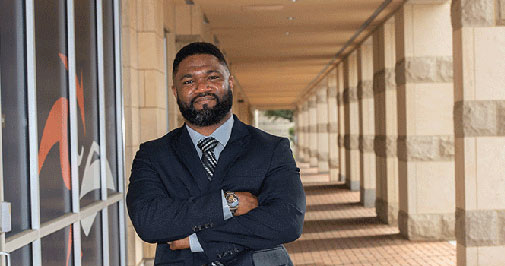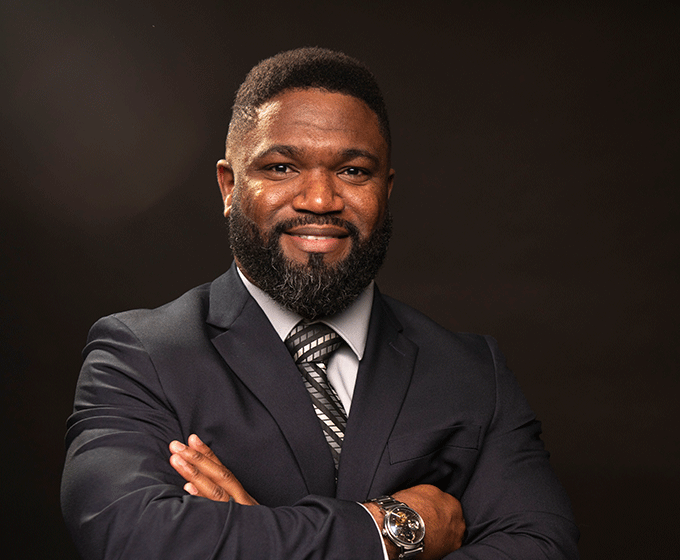Posted on October 31, 2023 by Brooke Crum

Willie Hale
People who live with chronic pain can improve their sense of belonging and reduce feelings of being a burden to others and, in turn, decrease the likelihood that they will die by suicide by “making peace with their pain,” according to a study by UTSA Assistant Professor of Psychology Willie Hale.
Hale’s study focused on the results of anonymous self-reporting on several questionnaires from 207 patients with chronic pain, most of whom were active-duty military members.
“We know for a fact that when people are in pain — and a lot of pain in particular — it makes them think about killing themselves because they don’t want to be in pain forever,” Hale said. “However, regardless of the level of one’s pain, there are ways we can intervene clinically to short-circuit the relationship between pain and suicide cognitions.”
“However, regardless of the level of one’s pain, there are ways we can intervene clinically to short-circuit the relationship between pain and suicide cognitions.”
Suicide is the 10th leading cause of death for American adults, so decreasing the risk of suicide is a prominent public health issue, according to the National Institute of Mental Health. U.S. service members and veterans exhibit higher rates of suicide, attempts and deaths compared to civilians. For instance, in 2020, the average number of veterans who died by suicide each day was about 17, according to the latest figures from the U.S. Department of Veteran Affairs.
 Additionally, veterans experience chronic pain at greater rates than those who have not served in the military, which makes them even more vulnerable to suicide risk. Previous research has shown that having chronic pain and pain catastrophizing are associated with higher levels of suicide ideation and behaviors.
Additionally, veterans experience chronic pain at greater rates than those who have not served in the military, which makes them even more vulnerable to suicide risk. Previous research has shown that having chronic pain and pain catastrophizing are associated with higher levels of suicide ideation and behaviors.
The idea behind the study comes from the Interpersonal Theory of Suicide, which suggests that severe pain causes people to have suicidal cognitions and that pain severity also increases the extent to which people feel like a burden on others. The theory states that suicidal behaviors emerge at the intersection of the desire to die by suicide and the ability to carry out the act, but the desire to kill oneself arises out of perceived burdensomeness — or feeling like a burden to others — and thwarted belongingness — or feeling rejected from others.
“When people with chronic pain feel like a burden to others, they are more likely to want to attempt suicide,” Hale said. “However, if they can learn to accept their pain and go about their days despite the pain, they can reduce their feelings of burdensomeness, which decreases their thoughts of suicide. They will still experience the pain, but they will feel better if they get up and go about their daily activities.”
Chronic pain acceptance is defined as “the ability to engage in activities that are meaningful toward an individual’s life goals, even if that means experiencing pain, as well as the ability to refrain from attempts to reduce or avoid pain,” according to Hale.
To make peace with their pain, those who experience chronic pain can use acceptance and commitment therapy techniques that will help them push through their pain and participate in the activities that make life enjoyable to them.
“What we were able to show is that this relationship between pain severity and perceived burdensomeness is different depending on your level of pain acceptance, as is the relationship between perceived burdensomeness and suicide. It matters whether or not you've made peace with the pain,” Hale said. “If you can move people from making no peace with their pain to just being a little bit okay with it, that cuts their suicide risk in half, and if you can get them to a high level of pain acceptance, it eliminates that risk altogether.”
The results demonstrate how pain acceptance could short-circuit the relationship between pain severity and perceived burdensomeness.
Given that pain acceptance reflects the degree to which individuals engage in activities that are meaningful even if they are experiencing pain, such acceptance might facilitate successful social connectivity and reduced thwarted belongingness simply because individuals with high pain acceptance are more likely to engage in activities with others, thereby making both thwarted belongingness and perceived burdensomeness seem less intractable, according to the researcher.
“Even if you can’t actually functionally do anything to make their pain better, if you can just get them to make peace with it, they’re going to be less likely to kill themselves,” Hale said.

